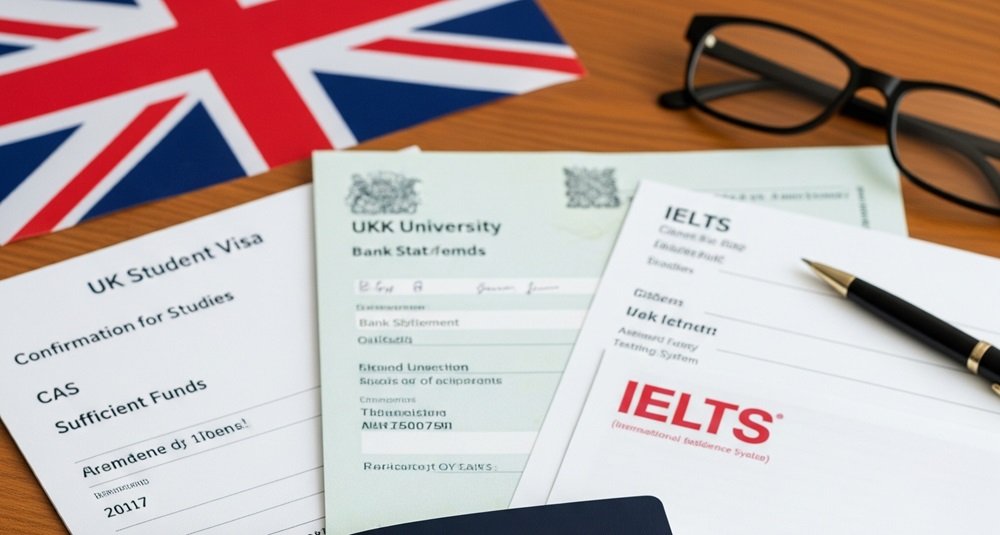So, you’re thinking about studying in the UK, huh? Well, that’s awesome!
The reason that we say that is the UK has some of the best universities in the world, and it’s a fantastic opportunity to grow academically and personally.
But to be honest, getting a student visa can feel like a bit of work.
In fact, there are documents to prepare, deadlines to meet, and a whole lot of boxes to tick.
Anyway, if you’re from Sri Lanka and planning to apply for a UK student visa, don’t worry, we’ve got your back.
Whereas this post will walk you through everything that you need to know, step by step, so you can focus on the exciting part, which is preparing for your new adventure.
As a matter of fact, think of this as your friendly guide to going through the visa process.
Because we’ll break down the requirements, give you a detailed checklist, and share tips to help you to avoid any common mistakes.
Therefore, by the time you finish reading, you’ll feel way more confident about the whole thing.
Table of Contents
ToggleUK Student Visa Requirements for Sri Lankans
Alright, let’s dive into the basics.
To get a UK student visa, or in other words, the “Student Route Visa,” there are a few key things you need to meet.
First of all, you need an unconditional offer letter from a licensed UK educational institution.
This means they’ve confirmed you’re all set to join their program.
Then, once you have that, you’ll receive something called a Confirmation of Acceptance for Studies or in short, a CAS.
Think of it as your golden ticket because it’s super important, and we’ll talk more about it later.
Next, you need to prove that you’ve got enough money to support yourself while you’re in the UK.
In fact, this isn’t just about tuition; it’s also about living expenses.
Therefore, the exact amount depends on where you’re studying, but we’ll cover that in detail soon.
Plus, another point is proving your English language skills. Where most programs require you to take an approved test like IELTS, though there are exceptions depending on your situation.
Oh, and one more thing: if you’re coming from Sri Lanka, you’ll need to take a tuberculosis (TB) test. It’s not optional, so make sure you plan for it ahead of time.
Complete UK Student Visa Documents Checklist
Now, let’s get into the main points: the documents you’ll need to prepare.
Trust us, this is where things can feel a little overwhelming if you don’t have a clear plan.
But don’t worry, we are here to break it down for you step by step.
In fact, we’ve divided everything into categories so you can tackle one section at a time.
This way, you won’t feel like you’re in a mess with documents.
Personal Identification Documents
Let’s start with the basics because, well, you can’t apply for a visa without proving who you are!
So, the first thing is your passport.
Make sure it’s valid and has at least six months left before it expires.
On the other hand, if you’re running low on time, renew it as soon as possible, as it’s not worth risking a rejection over something so simple.
Additionally, if you’ve had previous passports that show travel history to the UK or other countries, please include those as well.
That is because sometimes, having a clean travel record can work in your favour.
Moreover, if you’ve legally changed your name—maybe through marriage or a deed poll—you’ll need to provide proof of that.
For instance, this could be a marriage certificate, a court order, or any other official document that shows the name change. And while we’re on the topic of IDs, keep a few extra passport-sized photos just in case.
The reason for that is some centres might ask for them during the application process, even if they’re not specifically mentioned in the guidelines.
Academic Documents
This is where all your hard work comes into play.
To put it simply, you’ve earned those certificates, transcripts, and diplomas, and now’s the time to gather them all in one place.
So, to begin, start with your highest qualification—if you’ve completed A-Levels, O-Levels, or a degree and make sure you have the original certificates and transcripts of those.
On the other hand, if you’re transferring from another university or have professional qualifications (like ACCA or CIMA), include those too. In fact, universities often specify precisely what they need, so be sure to double-check their requirements.
Tip: If any of your documents are not in English, you’ll need a certified translation of those. This is non-negotiable. The UKVI (UK Visas and Immigration) takes this seriously, and submitting untranslated documents can lead to delays—or worse, a rejected application.
Financial Proof
The UK wants to ensure you can afford both your tuition and living expenses while you’re there.
As a matter of fact, they’re not just going to take your word for it—you’ll need solid proof to get over this.
Anyway, for most applicants, this means a bank confirmation letter of your FDs or savings account.
Here’s the deal: your statements or the bank balance confirmation letter of the FD must cover the last 28 days, and they need to clearly show that you have enough funds to cover your tuition fees and monthly living costs.
As of now, if you’re studying in London, you’ll need to prove you have £1,400 per month for living expenses on top of your tuition.
Outside London, the amount is slightly lower, at £1,250 per month.
Note: These amounts are subject to change, so always check the latest figures on the UK government website.
However, if someone else is sponsoring you—such as your parents or a relative—they’ll need to provide a sponsorship letter with their bank statements or any other bank documents.
Whereas the letter should confirm their relationship to you and state that they agree to support your studies financially.
This is because without this, the UKVI might question whether you can support yourself during your stay.
Oh, and one more thing: make sure the funds have been in the account for at least 28 days. Also, depositing a large amount of money right before applying won’t cut it—they want to see the source.
English Language Requirements
Unless you’re from an English-speaking country, you’ll need to prove your English language skills.
For most students, this means taking an approved test, such as the IELTS.
In fact, the required score depends on your course, but generally, universities expect a minimum overall band score of 6.0 or 6.5.
Plus, some programs may have higher requirements, so confirm with your institution.
Now, here’s some good news: if you’ve studied in English-medium schools or hold a degree taught entirely in English, you might not need to take a test.
For example, if you completed your A-Levels or undergrad in English, you could qualify for an exemption.
However, policies can change, so always verify directly with the UK government website or your university.
CAS (Confirmation of Acceptance for Studies)
Your CAS is essentially your ticket to studying in the UK.
Think of it as your university’s formal invitation.
Speaking of which, it includes key details about your course, tuition fees, and personal information, such as your name and date of birth.
Remember that every single detail on your CAS must match the details in your supporting documents.
The reason for that is even a small typo can cause issues, so triple-check everything.
In the worst-case scenario, if you spot an error, contact your university immediately, as they can issue a new CAS if needed.
Moreover, timing is crucial in this case as well.
That is because your CAS is only valid for six months, so don’t request it too early.
Therefore, ideally, aim to get it once you’re ready to start your visa application.
TB Test Certificate
If you’re applying from Sri Lanka, you’ll need to take a tuberculosis (TB) test at an approved clinic.
This is mandatory, no exceptions.
Anyway, the test itself isn’t complicated as it usually involves a chest X-ray, but you’ll need to book an appointment in advance.
Trust us, clinics can get busy, especially during peak application seasons, so don’t leave this until the last minute.
With that, once you’ve taken the test, you’ll receive a certificate.
Note: Keep in mind that it’s only valid for six months, so timing is crucial once again.
Therefore, schedule your test close to your visa application date to avoid complications.
Visa Application & Biometrics
Finally, it’s time to fill out the online visa application form.
This part is pretty simple, but take your time to answer every question accurately.
That is because mistakes here can lead to unnecessary delays.
Anyway, after completing the form, you’ll need to pay the visa fee.
Note: Keep the payment receipt safe, as it serves as proof that you’ve started the process.
Next, you need to book an appointment at the VFS to submit your biometrics.
This involves scanning your fingerprints and taking a digital photo.
Trust us, it’s quick and painless, but please make sure that you go there 15 minutes before the scheduled time and bring all your necessary documents.
Tip: Missing your appointment can set you back weeks, which nobody wants.
With all that, once you’ve submitted everything, sit tight and wait for a decision.
Remember that processing times can change, but staying in line and submitting a complete application will give you the best chance of success.
Suggested Reads:
- UK Student Visa Spouse: Requirements, Application Process & Work Rights
- UK Student Visa Requirements For Sri Lanka
Common Mistakes Sri Lankan Applicants Make
Let’s be honest—mistakes happen, especially when there’s so much to remember.
But knowing what NOT to do can save you a lot of stress.
In fact, one of the biggest mistakes is submitting incomplete or mismatched documents.
For example, if your name on the CAS doesn’t match your passport, it’s a red flag.
Therefore, like always, double-check everything before hitting submit.
Another common issue is outdated financial proof.
Remember, your bank statements or the FDs must be no older than 28 days.
Whereas sending older ones can lead to rejection, even if you have the money. And speaking of finances, don’t forget to include ALL required documents.
For instance, if you’re sponsored, both your sponsor’s letter and their bank statements or the FD certificates are crucial.
Note: Don’t underestimate the importance of the TB test either. Some applicants leave it until the last minute, only to find that appointments are fully booked.
Tips for Organizing Your Documents
Staying organized is the secret sauce to a smooth visa application.
As a matter of fact, start by creating a folder—physical or digital—and label it clearly.
Then, divide it into sections, such as “Personal ID” and “Academic Docs,” and so on.
Trust us, this makes it easy to find what you need quickly.
In addition to that, make copies of everything.
Seriously, duplicates are sometimes perfect. Therefore, keep one set with you and another with a trusted friend or family member.
That is because if something gets lost, you don’t need to panic. After all, you’ve got backups.
Also, create a checklist.
Whereas you can tick off each item as you collect it.
Speaking of which, this helps you to visualise your progress and confirm that nothing slips through the cracks.
How Long to Keep Your Documents Ready Before Applying
As with everything, timing is crucial when it comes to visa applications.
Ideally, you can start preparing your documents at least three months before your intended travel date.
Whereas this gives you plenty of time to sort out any issues without rushing.
For example, getting your TB test done takes time, especially if clinics are busy.
Moreover, the same applies to translating documents or correcting errors on your CAS.
Plus, the visa processing itself can take several weeks. Therefore, starting early means you won’t feel under pressure if there are delays.
And there you have it—a complete guide to the UK student visa documents checklist from a Sri Lankan perspective.
Sure, it might seem overwhelming at first, but breaking it down into manageable steps makes it totally simple.
Anyway, just stay organised, follow the checklist, and give yourself enough time to prepare.
Trust us, with a bit of effort, you’ll be ready to take that next big step toward your dream education.
So, good luck—you’ve got this!
Contact Travelco Education & Visa Services a UK student visa consultants in Sri Lanka to apply UK student visa.
FAQs
Passport, CAS, financial proof, academic documents, TB test certificate, and English language test results.
You’ll need to submit originals, but keep photocopies for your records.
No older than 28 days at the time of submission.
Yes, it’s mandatory for applicants from Sri Lanka.
In some cases, yes, such as if you’ve studied in English-medium schools or hold a degree that has been taught in English.







